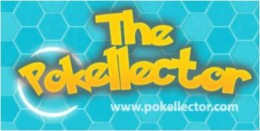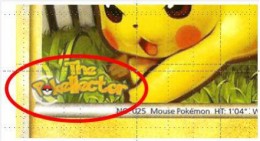On Jan. 23, Pokémon sued an individual named Marcus Frasier, owner and operator of the Pokellector App and pokellector.com website, for trademark and copyright infringement. While the lawsuit focuses on gaming cards, it raises interesting issues for sports trading cards, namely, when do you have the right to show scanned images of trading cards?
The gist of the lawsuit is that Frasier's Pokellector app and website allegedly use certain Pokémon trademarks and copyrights without Pokémon's permission. For trademarks, Pokémon alleges that the Pokellector name/image is substantially similar to the "font and style of the 'Pokémon' logo," which could cause consumer confusion.
Compare the Pokellector logo:

with Pokémon's logo:

It's not much of a stretch to assert the Pokellector image was generated with the Pokémon image in mind; they both use the same "o," the letters are at the same angles, they're both yellow, etc. Given this, Pokémon alleges that when consumers see its trademarks (e.g., Pokémon, the Poké Ball, and expansion set logos) on Pokellector's website and app, they'll think the website and app are endorsed or sponsored by Pokémon.
The trademark claims look strong for Pokémon at this early stage in the case. However, because these issues are not overly interesting for the sports trading card world, we'll stop that analysis here.
It's the copyright issues that are more pertinent.
It appears that the Pokellector app and website allow users to view listings of Pokémon cards and, in most instances, when users click on the name of the card, an image of the card appears on the screen. These images are allegedly identical to the cards copyrighted by Pokémon except for one thing, the addition of the Pokellector logo to the cards:

Pokémon alleges that by adding this logo to the cards, Pokellector improperly "branded" these cards in an apparent attempt to thwart further copying by others.
Legal translation: To prevent others from copying the allegedly unauthorized copies that it copied, Pokellector marked them with its own mark.
Kind of ironic.
With sports cards in mind, the copyright issues in this case are interesting for two reasons. First, if you search eBay, quite a few sellers "brand" the image of the trading cards they are selling with their store name. For those who do this, be wary. The Pokellector's "branding" aggravated Pokémon to the point of bringing a lawsuit. Given lawsuits tend to move in trends, this Pokémon claim could lead to additional policing efforts by sports trading card manufacturers to stop this practice on the secondary market.
The second reason these issues are interesting is because every time someone makes a copy of a copyrighted image (say, scanning a card to sell on eBay), that is technically copyright infringement. Now, there may be a defense (eg, fair use), or the industry's practice of ignoring/encouraging such a practice on the secondary market may make it clear that the industry will not enforce their copyrights against the secondary market. Even so, it is technically copyright infringement.
Although Pokémon's lawsuit discusses "rebranding" in the copyright infringement claim, it also focuses on the simple fact that the Pokellector website and app have "unauthorized copies of Pokémon cards" on them.
Legal translation: Technically, Pokémon alleges simply putting copies of images of its trading cards on a website or in an app without Pokémon's permission equals copyright infringement.
The question that arises is where is the dividing line between permitted-technically-infringing uses versus unauthorized-infringing uses of trading card images? It looks like eBay use is likely OK given the millions of Pokémon cards currently for sale there (with images of those cards), but is a website that provides images of cards for indexing purposes going too far in Pokémon's mind?
Time might tell, but given the strength of Pokémon's trademark and "rebranding" claims, I doubt the case will proceed far enough to give clarity on this most interesting copyright issue.
It should be emphasized that the sports trading card industry likely would not be as aggressive as it appears Pokémon is being here. In fact, sports trading card manufacturers seem to encourage the displaying of images of their cards online. Also, Pokémon is more active in protecting copyrighted images of its cards. For example, in 2010 it accused the "Beckett Pokémon Unofficial Collector" magazine of infringing Pokémon's copyrights because it allegedly published images of hundreds of Pokémon cards without permission. That lawsuit was resolved confidentially a little over six months after its filing (in other words, before a court could chime in on what would be permitted uses of copyrighted images).
Now, in the legal field, you're trained to identify problems that could arise in the future…even if they are far-fetched. Here, let's say, hypothetically, that a sports trading card company is losing money, and is on the verge of going out of business. Its sue-happy CEO, at the prodding of his or her favorite law firm, launches a plan to potentially make money for the ailing company. You see, this company has been around for quite a while, and there just happen to be exactly one million eBay listings selling its cards. To sell those cards, each eBay listing has an image of those cards.
Images which are technically copyright infringements.
The copyright statute allows copyright owners to recover a minimum of $750 per infringement. That means, there's potentially a million infringement actions that are in total worth a minimum of $750,000,000. More than enough to save the company.
Yeah, it'd be crazy, and there are likely lots of defenses, but this scenario is possible.
I grant you, it's not very likely, but given how crazy the sports trading card world is, anything is possible.
If you're interested, here's a copy of the complaint for your review.
The information provided in Paul Lesko's "Law of Cards" column is not intended to be legal advice, but merely conveys general information related to legal issues commonly encountered in the sports industry. This information is not intended to create any legal relationship between Paul Lesko, the Simmons Browder Gianaris Angelides & Barnerd LLC or any attorney and the user. Neither the transmission nor receipt of these website materials will create an attorney-client relationship between the author and the readers.
The views expressed in the "Law of Cards" column are solely those of the author and are not affiliated with the Simmons Law Firm. You should not act or rely on any information in the "Law of Cards" column without seeking the advice of an attorney. The determination of whether you need legal services and your choice of a lawyer are very important matters that should not be based on websites or advertisements.
 |
$55.00






















